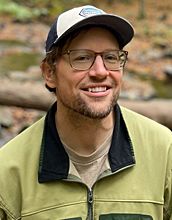Dr. David Porter joins the Antarctic Sciences Section in Antarctic Oceans and Atmospheres
The Office of Polar Programs, Antarctic Sciences Section is pleased to welcome Dr. David Porter as program director in Antarctic Oceans and Atmospheres.
Dr. Porter is an Associate Research Scientist at the Lamont-Doherty Earth Observatory in the Climate School at Columbia University. He studies how the atmosphere and ocean drive changes in the ice sheets, and how the resulting changing sea level affects coastal communities. Dr. Porter's research involves climate processes at high latitudes and is particularly interested in the interactions between different Earth System components. His expertise is at this intersection of traditional disciplines.
Dr. Porter has flown aerogeophysical surveys with NASA Operation IceBridge, the British Antarctic Survey for the International Thwaites Glacier Collaboration, and the ROSETTA-Ice project. Ambitious to collect crucial new ocean observations near ice sheets, he's sailed aboard the RVIB Nathanial B. Palmer to the remote East Antarctic coast, has deployed air-launched ocean profilers from LC-130 in the Ross Sea, and works with local fishers and hunters in Greenland to collect regular temperature profiles in remote fjords. Committed to the co-production of science both in New York City and further afield, Dr. Porter has worked with coastal communities in Greenland to link changes in the ice sheets to impacts on the built environment and social systems.


